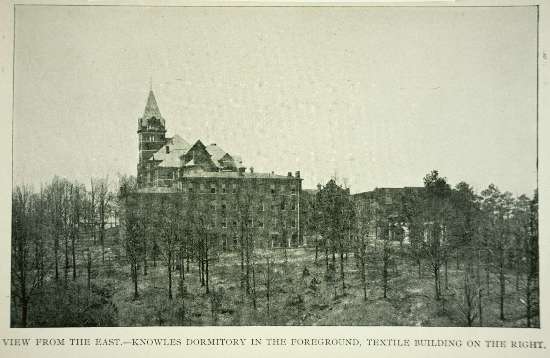 |
gtanno189899-11
Location:
T171 .G42 G49x 1888-1899
Title: Date:
View from the east-Knowles Dormitory in the foreground, Textile Building on the right
1899?
Content:
View of Georgia Tech campus from the East with Knowles dorm in the foreground and the textile building on the
right.
History:
From Warren Drury's Thesis: When the Georgia School of Technology first opened, students found lodging and
board in the surrounding area because no dormitory or dining hall was available on campus. One of Hall's
actions was to erect at a cost of $4000 two frame buildings to house students. Students called these
buildings the "shacks."
Representative Clarence Knowles of Fulton County was a tireless supporter of Hall's plan to build a
dormitory, arguing that dormitories would make the school accessible to the poorer students of Georgia.
Knowles even took his fellow legislators to the school to see for themselves the need for a dormitory.
In 1897, the legislature provided funds to build the dormitory. Bruce and Morgan, architects of the two
previous buildings on campus, won the architectural commission for the dormitory in 1897. The dormitory,
which opened in September 1897, was named for Clarence Knowles. Like "the shacks," Knowles Dormitory had
neither electricity nor steam heat. It did have 36 rooms housing two students each, a gymnasium, shower
facilities and a dining room. In January 1897, 175 students were enrolled. Within a year of the
dormitory's opening, enrollment had jumped to 267, requiring that three students share a room instead of
two.
From the Georgia School of Technology Announcement: Of the A. French Textile School Lyman Hall writes May
15, 1900 : "In (sic) behalf of the people of the State of Georgia and the Local Board of Trustees of the
Georgia School of Technology, I extend to Mr. French our thanks and appreciation for his continued aid to
this institution. His benefactions to the school have been $13,100. Aaron Samuel French, a wealthy
industrialist in Pittsburgh, Pennsylvania provided $2,500 unconditionally and $3,000 conditional upon the
city of Atlanta providing a matching amount. Aaron Samuel French, of Pittsburg, Pa., has given two
scholarships to the Georgia School of Technology, which are self-perpetuating, in monthly notes without
interest. The winner of the scholarship will be furnished funds at such times as the President may think
necessary for expenses, books, fee, etc, but not over $125 will be furnished each year. The Announcement
for 1898-99 notes: In December, 1898, the Legislature appropriated $10,000 per annum for two consecutive
years for the support of the Textile Department. The establishment of this department is an entirely new
feature in education in the State of Georgia, and the superior equipment for instruction in the manufacture
of all grades of cotton goods is expected to bring a material increase in the wealth and prosperity of our
p construction, its
The department offers unexcelled advantages to the young man who intends to enter the textile industry.
as in the branches relating directly to the textile trade. Besides the usual subjects given in the textile
f lectures,
recitations, demonstrations, and practice on the splendid equipment of the loom.
ssion reflected the Bostonian Lockwood Greene's experience in mill